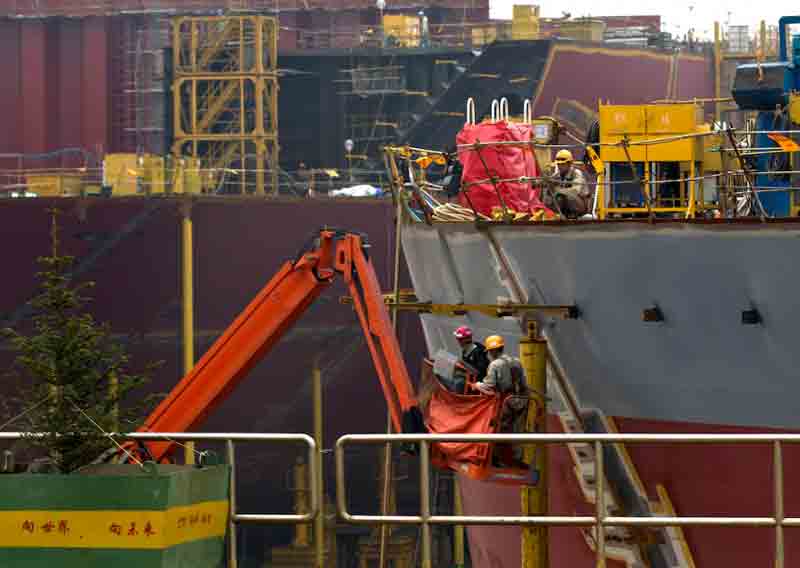In just twenty years, China has emerged as the leading force in shipbuilding, capturing over 50% of the global commercial shipbuilding market, while the U.S. share has plummeted to a mere 0.1%. This shift presents significant economic and national security challenges for the United States and its allies, as highlighted in a report published on Tuesday by the Center for Strategic and International Studies.
In 2024, a single Chinese shipbuilder produced more commercial vessels by tonnage than the entire U.S. shipbuilding sector has managed since the conclusion of World War II. According to the Washington-based bipartisan think tank, China now possesses the largest naval fleet in the world, as detailed in its comprehensive 75-page report.
The report emphasizes that the decline in U.S. and allied shipbuilding capabilities represents an immediate threat to military preparedness, diminishes economic prospects, and bolsters China’s ambitions for global power projection.
Concerns regarding the deteriorating state of U.S. shipbuilding have intensified in recent years, particularly as the nation confronts increasing challenges from China, which boasts the second-largest economy and seeks to alter the global order. During a congressional hearing in December, senior officials and lawmakers called for decisive action.
Recently, President Donald Trump informed Congress that his Republican administration would work to “revive” the American shipbuilding industry for both commercial and military vessels, proposing the establishment of “a new office of shipbuilding in the White House.”
Trump remarked, “We used to produce a significant number of ships. While our current output is limited, we are poised to ramp up production quickly, which will have a substantial impact.”
In February, leaders from four prominent labor unions urged Trump to enhance American shipbuilding efforts and implement tariffs along with other stringent measures against China, which has been increasingly dominating this industry.
Matthew Funaiole, a senior fellow at the China Power Project at CSIS and a co-author of the report, stated, “What we are witnessing is a growing acknowledgment of the strategic importance of shipbuilding and port security, alongside the challenges posed by China.” He noted that concerns regarding shipbuilding are largely bipartisan.
The report highlighted that China’s shipbuilding industry has undergone “a remarkable transformation” over the last twenty years, evolving from a “marginal player” to a leading force in the global market, primarily driven by the state-owned China State Shipbuilding Corporation (CSSC).
Simultaneously, China has significantly expanded its naval capabilities. A CSIS evaluation from last year indicated that China was operating 234 warships, compared to the U.S. Navy’s 219, although the U.S. maintained an edge in guided missile cruisers and destroyers.
In crafting recommendations for U.S. competitiveness against China, researchers focused on the Chinese company’s implementation of Beijing’s “military-civil fusion” strategy, which merges the defense and commercial sectors.
The findings revealed that CSSC, which manufactures both commercial and military vessels, exports three-quarters of its commercial output to international buyers, including U.S. allies such as Denmark, France, Greece, Japan, and South Korea. Consequently, these foreign companies are channeling billions of dollars to Chinese shipyards that also produce warships, thereby facilitating the modernization of China’s navy and supplying Chinese defense contractors with essential dual-use technology, according to the report.
CSIS researchers have recommended that the United States should focus on revitalizing its shipbuilding industry as a long-term solution, while also collaborating with allies to enhance shipbuilding capabilities beyond China. In the short term, they advised implementing measures to create a more equitable competitive environment and to “disrupt China’s opaque dual-use ecosystem.” This could include imposing docking fees on vessels manufactured in China and severing financial and business connections with CSSC and its subsidiaries.
The Trump administration has introduced proposals for new fees on vessels associated with China that dock at U.S. ports. Recently, a consortium led by BlackRock reached an agreement to acquire interests in 43 ports worldwide, including two located on either side of the Panama Canal, from a conglomerate based in Hong Kong.
Discover more from Defence Talks | Defense News Hub, Military Updates, Security Insights
Subscribe to get the latest posts sent to your email.





